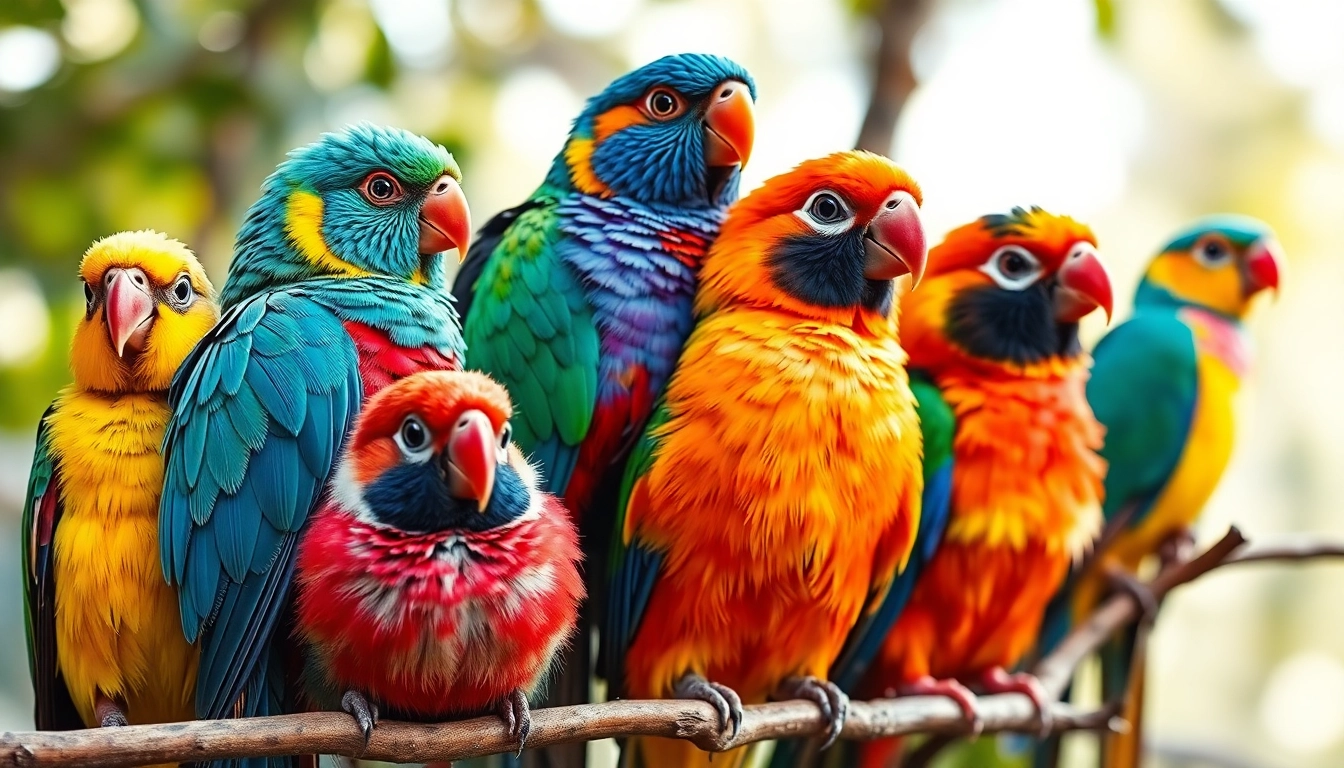Investing in a pet bird can bring immense joy, companionship, and a touch of vibrant life into your home. Whether you’re a first-time bird owner or a seasoned avian enthusiast, understanding the nuances of pet bird ownership is crucial for ensuring a fulfilling and responsible experience. From choosing the right species aligned with your lifestyle to mastering proper care techniques, this comprehensive guide aims to elevate your knowledge and commitment to these intelligent, colorful, and often vocal companions. If you’re ready to explore the fascinating world of pet birds, let’s delve into essential insights and practical tips to help you thrive as a responsible bird owner.
Introduction to Pet Birds: Why They Make Great Companions
Benefits of Owning Pet Birds
Pet birds are more than just picturesque creatures with vibrant plumage; they are widely recognized for their intelligence, social nature, and ability to form strong bonds with their owners. Unlike many other pets, birds can be highly interactive, capable of mimicking sounds and sometimes even speech, which enhances the sense of companionship. Their cheerful chirping and lively antics can brighten any environment, reducing stress and fostering a sense of wellness. Moreover, owning a pet bird encourages routine and responsibility, as caring for such delicate creatures entails regular feeding, cleaning, and health monitoring.
Research indicates that having pet birds can improve mental health, provide a sense of purpose, and boost social interactions, especially for individuals living alone or in urban settings with limited space. The diversity in species means there’s a feathered friend suited for various lifestyles, from active families to quiet singles, making them remarkably adaptable companions.
Understanding the Bond: Why They Are Considered Low-Key but Rewarding Pets
Despite their reputation for loud calls and sometimes demanding needs, many bird owners report deep emotional bonds that rival those formed with traditional pets like dogs and cats. Some species, such as cockatiels and lovebirds, are renowned for their affectionate nature, often seeking out human interaction and enjoying cuddles. The key lies in understanding each species’ temperament and providing consistent socialization, which fosters trust and mutual companionship. This emotional bond, combined with their long lifespans, makes pet birds uniquely rewarding for dedicated owners.
A Brief Overview of Popular Bird Species and Their Traits
Different pet bird species come with distinct characteristics, care requirements, and temperaments. For example, parakeets—or budgerigars—are known for their playful and social nature, while larger parrots like macaws are prized for their intelligence and ability to replicate speech. Doves and canaries are excellent choices for quiet households, while lovebirds and conures offer lively interactions and vibrant colors. Familiarity with these traits helps owners select the correct species that aligns with their environment, lifestyle, and commitment level.
Understanding Bird Lifespans and Commitments
Owning a pet bird is a long-term commitment. Depending on the species, lifespans can vary from about 5 to over 80 years. Parakeets typically live 6-10 years, whereas larger parrots like macaws may reach 50-80 years, making them lifelong companions. This longevity necessitates thorough planning regarding long-term care, potential financial costs, and emotional investment. Responsible ownership involves understanding these timelines to ensure a good quality of life for your feathered friend throughout their lifespan.
Choosing the Right Pet Birds for Your Lifestyle
Birds Suitable for Beginners
For newcomers to avian ownership, selecting low-maintenance, hardy, and social species is advisable. Parakeets, also called budgerigars, are often considered ideal beginners due to their resilience, affordability, and ease of handling. Cockatiels also fit well in this category because they are forgiving of minor neglects, friendly, and capable of forming bonds with their owners. When choosing a beginner bird, consider species that are not overly loud, large, or requiring complex environments, as these factors can otherwise pose challenges for first-time owners.
Best Pet Birds for Small Spaces
Urban dwellers and those with limited living space benefit from choosing smaller, compact bird species. Finches and canaries are excellent options—they are small, quiet, and easy to accommodate within a modest cage setup. Lovebirds, while slightly larger, are still manageable and provide lively companionship without requiring expansive aviaries. Proper cage size and placement are vital, as these birds need room to stretch, exercise, and engage in natural behaviors, so investing in appropriate enclosures enhances their well-being.
High Maintenance vs. Low Maintenance Species
Bird species differ significantly in their care needs. High-maintenance birds like macaws, Amazon parrots, and cockatoos demand extensive social interaction, specialized diets, enrichment, and larger living spaces. They are also more prone to disease if not monitored carefully. Conversely, species such as finches, canaries, and budgerigars generally require less interaction and are easier to care for, making them suitable for busy individuals or those new to bird keeping. Understanding these differences allows owners to select species aligned with their ability to provide proper care and attention.
Matching Species to Your Lifestyle and Environment
Before choosing a pet bird, assess your daily routine, living conditions, and available time. Active families may prefer birds that thrive in social environments, while busy professionals might opt for more independent species like poicephalus parrots that can entertain themselves. Additionally, consider your household’s noise level; some birds have loud calls that might not be suitable for apartment settings. Evaluating these factors ensures a harmonious fit, minimizing stress for both owner and bird.
Care and Maintenance for Pet Birds
Health, Diet, and Nutrition Essentials
Proper health management forms the foundation of successful pet bird ownership. A balanced diet tailored to the species’s dietary needs is crucial. Most pet birds thrive on a mix of high-quality commercial pellets, supplemented with fresh fruits, vegetables, and occasional grains. Avoid feeding birds toxic foods like avocado, chocolate, caffeine, or alcohol. Clean, fresh water should always be available, and feeding schedules should be consistent to prevent malnutrition or obesity.
Monitoring for signs of illness—such as feather plucking, changes in droppings, lethargy, or respiratory issues—is vital. Regular veterinary check-ups with an avian veterinarian help in early diagnosis and treatment. Vaccinations, parasite control, and proper hygiene routines further ensure your bird’s health.
Habitat Setup and Enrichment
A stimulating environment mimics natural conditions, promoting mental and physical well-being. The cage should be appropriately sized for the species and include perches of varying diameters, toys, and foraging opportunities. Incorporating natural branches, mirrors, and puzzle feeders encourages activity and mental engagement. Daily out-of-cage time within a safe environment fosters social bonds and physical exercise.
Routine Healthcare and Common Issues
Routine health protocols include nail trimming, beak maintenance, and cleaning of cages and accessories. Recognizing common issues like feather disease, mites, or nutritional deficiencies allows for prompt intervention. The immune system of birds can be compromised by stress and poor diet; thus, minimizing environmental stressors and providing enrichment are necessary. Regular health checks, good hygiene, and attentive observation create a healthy, happy environment for your pet.
Training, Socialization, and Behavior Management
Building Trust and Social Skills
Socialization begins immediately upon bringing your bird home. Consistent handling, gentle interactions, and positive reinforcement foster trust. Use treats, calm voices, and patience to reduce fear and encourage engagement. Many species are capable of learning simple tricks or commands, which in turn strengthen your bond and improve handling safety.
Handling Problem Behaviors
Common behavioral challenges such as biting, screaming, or feather plucking can often be addressed through understanding their root causes—be it boredom, stress, or insufficient socialization. Implementing routine schedules, providing enrichment, and avoiding punishment are effective strategies. Consulting avian behavior specialists can provide tailored solutions for persistent issues.
Enrichment Activities for Mental Stimulation
Keeping your bird mentally stimulated reduces destructive behaviors and enhances overall happiness. Activities can include foraging toys, puzzle feeders, new toys rotated regularly, and safe opportunities for flight or exploration outside the cage. Social interactions, training sessions, and environmental changes all contribute to a fulfilling avian experience.
Longevity and Responsible Ownership
Long-term Care Planning
Long-term ownership requires planning for your bird’s entire lifespan. This includes financial considerations for veterinary care, adequate cage and environment maintenance, and potential lifestyle changes. Diversify your knowledge about the species-specific needs and commit to ongoing education to adapt as your bird ages.
Understanding Costs and Time Investment
Cost analysis encompasses initial setup—cage, toys, and supplies—and ongoing expenses like food, veterinary care, and replacements. Time commitment involves daily feeding, cleaning, social interaction, and health monitoring. Larger parrots, for example, demand several hours a day for socialization, while smaller species may require less but still benefit from dedicated attention.
Ensuring Happiness and Well-being
Creating an enriching environment, maintaining consistent routines, and providing opportunities for natural behaviors underpin your bird’s happiness. Respecting their need for social interaction, mental stimulation, and proper nutrition will ensure they remain healthy and content throughout their lives.
In summary, pet birds can be extraordinary companions when cared for responsibly and thoughtfully. Thorough research, patience, and dedication transform birdkeeping from a simple hobby into a fulfilling partnership with a living, intelligent creature. By understanding individual species needs, preparing appropriately, and committing to long-term care, owners can enjoy the numerous benefits these vibrant creatures have to offer.

